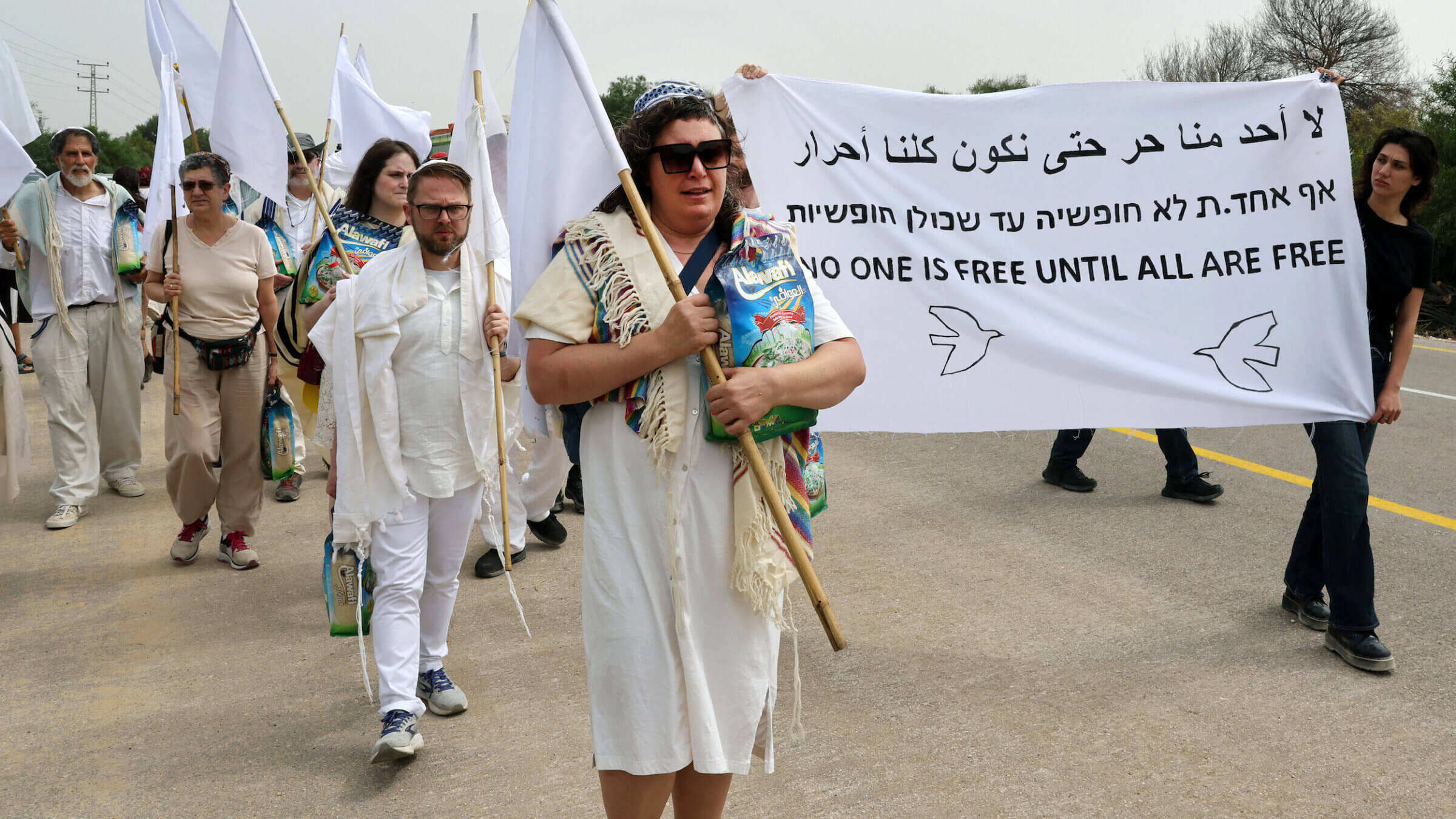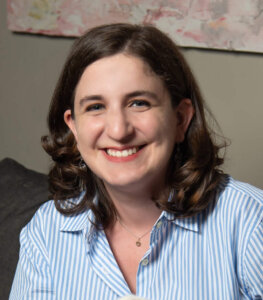Families of Oct. 7 victims beg for peace. By ignoring them, Israel’s government dishonors their loved ones’ memories
The needless loss of civilian lives in Gaza is an affront to humanity — and to the Hamas victims Israel’s war is being fought, in part, to avenge

A peace march in Israel approaches the Erez crossing on the border with northern Gaza Strip in April. Photo by Jack Guez/AFP/Getty Images
In horror, I watched a video of a Palestinian man in Gaza holding up a dead child’s lifeless body, the area behind him engulfed in flames.
And as I looked at the devastation wrought by an Israeli strike that killed more than 40 civilians in a displacement camp near Rafah on Sunday, I thought of Yonatan Zeigen.
Zeigen is the son of the late Vivian Silver, a peace activist killed by Hamas’s Oct. 7 attack on Israel. In an interview only a week after the massacre, when Silver was still believed to be a living hostage in Gaza, he was asked what his mother would think of Israel’s military response.
“She’d be mortified,” he said. “Because you can’t cure dead babies with more dead babies.”
Israel has promised to honor the victims of Oct. 7. But who is being honored when more than 40 innocent civilians in a tent camp for the displaced are killed after an Israeli airstrike?
Of course, the victims of Oct. 7 were not all alike, and neither are their families. There were some, for example, who disagreed with Zeigen back then. But he was also not alone in calling for peace.
“I understand the anger and the frustration, and I understand the desire for revenge, but I also see where this revenge has gotten us over the past century,” Maoz Inon, a peace activist whose parents were killed on Oct. 7, told Haaretz later that month. “If the Hamasnik who fired the missile at my parents’ house was sitting across from me right now, I would talk to him. I would want to understand. I would want him to see me cry.”
In that same interview, Inon’s sister, Mayaan, asked if it is really right to continue the fighting — “Or do we want to look for a different, less violent, less cruel and destructive path?”
Israel has approved a new national remembrance day for the Oct. 7 attack. But to mark a date and to bear witness are two different things. How much can a day of remembrance mean for the bereaved loved ones of that attack’s victims, like Zeigen and the Inon siblings, who dream of peace — and have seen Israel, instead, use their loved ones’ legacies as justification in this brutal war?
“You know,” Zeigen told me in an interview on Thursday, “I think the only right thing that this government should have done since Oct 7 is to make the dead victims of peace, and not of war.”
“Not to bomb in their names, kill others in their names. To achieve peace in their names.”
All around, I see people saying they feel that the victims of Oct. 7 have been forgotten or overlooked, even erased. As videos from the weekend’s tragedy in Rafah made their way around social media, for example, I saw some supporters of Israel, presumably in response, tweet out photos of people killed on Oct. 7.
But conveniently ignoring that some of the victims dedicated their lives to peace, and that their families have called for an end to the fighting in their name — this, too, is a form of erasure.
For example, after Hayim Katsman was killed on Oct. 7, his sibling, Noy, told CNN’s Jake Tapper that “Most important for me and also for my brother is that his death won’t be used to kill innocent people … I don’t want anything to happen to people in Gaza like it happened to my brother, and I’m sure he wouldn’t have either.”
But it’s become clear that Israel, rather than respecting the voices among the Oct. 7 bereaved who demand peace, is using the tragic losses of that day as reason to continue a brutal war. The memory of the day is held up to justify denying aid to Palestinians; to rationalize alleged war crimes; to refuse, in Netanyahu’s case, to discuss the day after the war; and to excuse striking Rafah, even though roughly half of Gaza’s population, displaced by this war from elsewhere, is now there.
This is as true for the families of hostages as for the families of the dead. Israeli President Isaac Herzog, speaking at a Memorial Day commemoration earlier this month, spoke of the dead and also of the hostages, promising, “we never forget that there is no greater commandment than redeeming captives.”
But even as these promises have been made, hostages’ families are protesting against the government. They are calling for a deal with Hamas: a ceasefire that would honor their loved ones by bringing them — or their remains — home. Meanwhile, Israeli Prime Minister Benjamin Netanyahu’s security advisor, Tzachi Hanegbi, said this week that fighting will continue for seven more months.
In the almost eight months since Oct. 7, the Israeli government has appeared to have listened first and foremost to people like Finance Minister Bezalel Smotrich, who, on the evening of Oct. 7, said, “We have to be cruel now and not consider the captives overmuch,” a position he reiterated in February. I have wondered how that honors the victims. How adding to the dead honors the dead. Or, for that matter, the living.
“I can understand that I — that any specific person — am not the one to determine a government’s policy,” Zeigen said. “But I would expect a government to work towards the best interests of its people. And war is just not that. It’s not our interest. Creating more violence and more opportunities for extremism to rise is not in our interest.”














